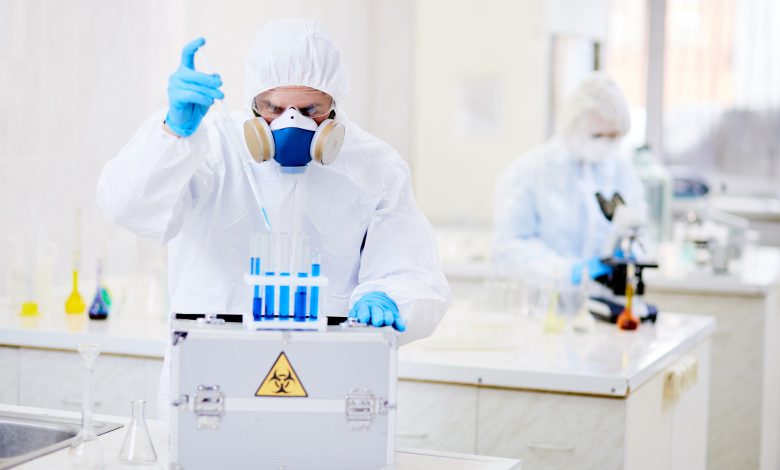
Most important information on Antigen, PCR and antibodies testing
إليك أبرز المعلومات عن “الأنتيجين” والـ”PCR” وفحص الأجسام المضادة
Dina Al Sabbagh – WGOQatar
Doha: The Ministry of Public Health announced Saturday evening the updating of protocol and procedures of coronavirus (Covid-19) testing and the adoption of antibody and antigen tests to detect the virus in the private health sector.
The new protocol allows private health-care centres which are approved by The Ministry to conduct two new types of virus detecting tests called “rapid antibodies testing and antigen testing” and PCR, which they used to perform during the Corona pandemic (Covid-19), so what is the difference between the three tests?
(1) Rapid Antigen Testing
Rapid Antigen testing provides fast and reasonably accurate screening for Covid-19.
– This test is performed for a variety of purposes, including assessing the condition of a patient who has respiratory symptoms and in the pre-hospital preparatory phase for minor procedures.
– Rapid Antigen Testing requires a nasal swab and the results of this test usually appear within 15 minutes, according to the website of the Ministry of Health.
– This testing is carried out by doctors and trained nursing and medical staff in approved private health facilities, which are committed to conducting examinations in accordance with high performance standards.
(2) Antibody testing:
– Antibody testing at approved private health facilities allows for the detection of the level of immunity against Coronavirus in people who have already been infected with the virus and in those who have received the vaccine against it.
This examination can be carried out in private health facilities by doctors and trained nursing and medical staff.
** There are two types of antibody testing:
This test requires a drop of blood to be inserted into a small test device and its results usually appear within 15 minutes.
(3) PCR testing:
Assess the condition of a patient who has respiratory symptoms or symptoms similar to those of Corona infection (Covid 19).
– Through this test, Covid-19 can be detected in its early infectious stages and in the prolonged shedding stage, that is often found in recovering patients.
– PCR is currently a necessary travel requirement, pre-surgical preparatory stages and confirmation of positive results for rapid testing of antigen.
– Polymerase chain reaction PCR testing is the golden standard in the diagnosis of corona infection (COVID 19), according to the website of the Ministry of Health.
Polymerase chain reaction is the most commonly used molecular test. Samples are taken using a swab of the nose and/or throat. Molecular tests detect the virus in the sample by amplifying viral genetic material to detectable levels, according to the WHO website.
The Ministry of Health explained that the introduction of new screening procedures and allowing them to be practiced by private health facilities is of great importance as it would strengthen the screening strategy for the detection of COVID-19 and enable the population of Qatar to have more health care services in this regard.
دينا الصباغ – WGOQatar
الدوحة: أعلنت وزارة الصحة مساء يوم السبت عن تحديث بروتوكول وإجراءات فحصوصات كورونا (كوفيد – 19) واعتماد فحوصات خاصة بالأجسام المضادة والمستضدات المولدة (الأنتيجين) للكشف عن الفيروس بالقطاع الصحي الخاص.
ويسمح البروتوكول الجديد لمراكز الرعاية الصحية التابعة للقطاع الصحي الخاص المعتمدة لدى الوزارة بإجراء نوعين جديدين من الفحوصات الخاصة بالكشف عن الفيروس والذين يطلق عليهما اسم (الفحص السريع للأجسام المضادة وفحص المستضدات المولدة – الأنتيجين) وفحص التفاعل المتسلسل للبوليمراز (PCR) الذي اعتادت هذه المراكز إجراءه خلال جائحة كورونا (كوفيد – 19)، فما هو الفارق بين الفحوصات الثلاثة؟
(1) فحص “الأنتيجين”
– يقدّم الفحص السريع للمستضدات المولدة – الأنتيجين نتائج سريعة ودقيقة بدرجة معقولة للكشف عن الإصابة بفيروس كورونا (كوفيد – 19).
– يتم إجراء هذا الفحص لأغراض متعددة منها تقييم حالة المريض الذي تظهر لديه أعراض مرضية تنفسية وفي المرحلة التحضيرية السابقة لإدخال المريض إلى المستشفى لإجراء العمليات الجراحية البسيطة.
– يتطلب الفحص السريع للمستضدات المولدة – الأنتيجين إجراء مسحة عن طريق الأنف وتظهر نتائج هذا الفحص عادة خلال 15 دقيقة، بحسب الموقع الإلكتروني لوزارة الصحة.
– يتم إجراء هذا الفحص من قبل الأطباء والكوادر التمريضية والطبية المدربة في المنشآت الصحية الخاصة المعتمدة والتي تلتزم بإجراء عمليات الفحص وفق معايير أداء عالية.
(2) فحص الأجسام المضادة:
– يتيح فحص الأجسام المضادة في المنشآت الصحية الخاصة المعتمدة تحديد مستوى المناعة ضد كورونا لدى الأشخاص الذين سبق لهم التعرض للإصابة بعدوى هذا الفيروس ولدى الأشخاص الذين تلقوا اللقاح ضده.
– يمكن إجراء هذا الفحص في المنشآت الصحية الخاصة من قبل الأطباء والكوادر التمريضية والطبية المدربين.
** هناك نوعان من فحص الأجسام المضادة:
يتطلب هذا الفحص إدخال قطرة من الدم في جهاز اختبار صغير وتظهر نتائجه عادة خلال 15 دقيقة.
(3) فحص الـ”بي سي آر”:
– تقييم حالة المريض الذي تظهر لديه أعراض مرضية تنفسية أو أعراض مشابهة لأعراض الإصابة بعدوى كورونا (كوفيد 19).
– يمكن من خلال هذا الفحص الكشف عن الإصابة بفيروس كورونا (كوفيد 19) في مراحله المبكرة المعدية وفي المرحلة المطولة لنشر المرض والتي غالباً ما يتم رصدها لدى الأشخاص الذين يمرون بطور التعافي من المرض.
– يعتبر فحص التفاعل المتسلسل للبوليمراز (PCR) في الوقت الراهن من المتطلبات الضرورية للسفر، والمراحل التحضيرية السابقة للعمليات الجراحية، وفي تأكيد النتائج الإيجابية للفحص السريع للمستضدات المولدة (الأنتيجين).
– يعتبر فحص التفاعل المتسلسل للبوليمراز المعيار الذهبي في تشخيص الإصابة بعدوى كورونا (كوفيد 19)، بحسب الموقع الإلكتروني لوزارة الصحة.
ويُعد تفاعل البوليميراز المتسلسل الاختبار الجزيئي الأكثر استخداماً. وتُؤخذ العيّنات باستخدام مسحة من الأنف و/ أو الحلق. وتؤدي الاختبارات الجزيئية إلى الكشف عن الفيروس في العيّنة بتضخيم المواد الجينية الفيروسية إلى مستويات يمكن الكشف عنها، بحسب الموقع الإلكتروني لمنظمة الصحة العالمية.
وأوضحت وزارة الصحة أن استحداث إجراءات الفحوصات الجديدة والسماح بممارستها من قبل المنشآت الصحية الخاصة يعد على قدر كبير من الأهمية حيث أن من شأنه أن يعزز استراتيجية الفحص للكشف عن (كوفيد – 19) ويمكّن السكان في قطر من الحصول على المزيد خدمات الرعاية الصحية في هذا المضمار.



